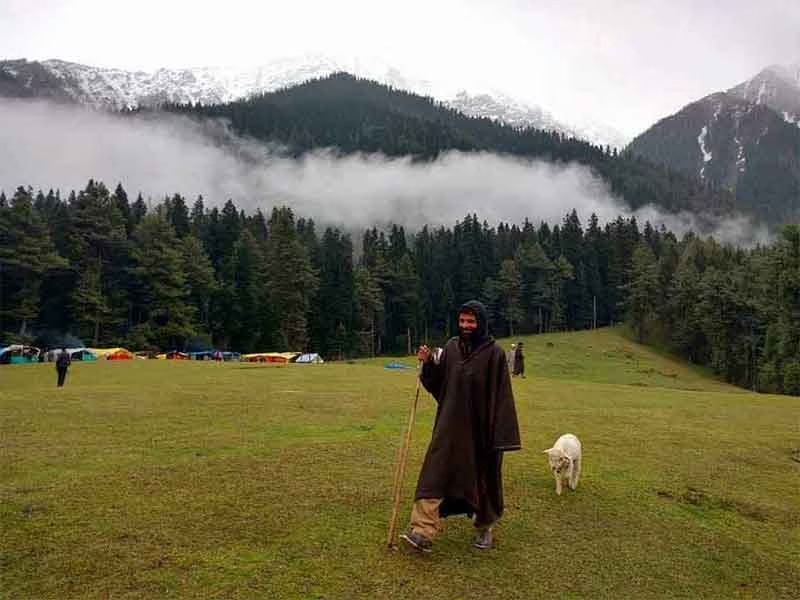
In the aftermath of the Pahalgam terrorist attack, what has caught the attention of strategic experts and left them perplexed is the U.S. President’s repeated obsession with Kashmir — his fixation on resolving a “1000-year-old dispute” and constant references to mediation have raised many eyebrows. This signals one thing clearly: Kashmir is once again emerging as the geopolitical epicenter of South Asia.
As two nuclear powers in South Asia indulge in military skirmishes, political messaging from the U.S. appears not only ambiguous but also contradictory. On one hand, there is an effort to center the Kashmir dispute as an issue of global relevance by hyphenating India and Pakistan together; on the other, the U.S. is leveraging trade tariffs to extract concessions from India — even discouraging companies like Apple from manufacturing goods there.
In the early days of globalization, the U.S. cultivated India as a key ally and an emerging power to contain China. It was widely believed that China wanted India confined within the subcontinent box — a position the U.S. actively resisted. But what has now transpired to reverse that position? Why is the U.S. attempting to relegate India back into the subcontinent box, even as it leads efforts to internationalize the Kashmir issue?
The times have clearly changed. The U.S. is no longer the “democracy” with an economic boom it could sell overseas. With its authoritarian tilt, Washington no longer needs democratic India as an ally to further liberal values. Cold geopolitical tactics will now define an increasingly illiberal America’s quest to “make itself great again.”
Meanwhile, the U.S. stance on Kashmir is fueling the fires that warm Islamabad, effectively reinforcing Pakistan’s long-standing project to keep the Kashmir dispute alive on the international stage. Washington continues to prop up Pakistan through IMF-backed bailouts and quiet diplomatic support — even as Pakistan’s democratic and economic foundations face collapse. Troublingly, the White House advisory board includes elected members with past affiliations to radical groups like LeT, which India recognizes as terrorist organizations involved in subversive activities in Kashmir.
The U.S.’s affection for Pakistan is nothing new. During the Cold War, it cultivated Pakistan as a vassal state to contain the Soviet Union, even propping up radical Islamist groups. Recently, Pakistan’s own ministry was caught on camera acknowledging that it has done the West’s “dirty work.” History, it seems, is repeating itself. Pakistan is once again being prepared to serve as a pawn to contain larger regional powers — and Kashmir sits at the center of this dangerous game.
The alternating U.S. messaging on Kashmir and trade tariffs is not a coincidence — we must unearth their interconnections.
Strategically, India has signaled a Western inclination in recent years by joining groupings like the QUAD, aligning itself with the U.S., Japan, and Australia under the broader Indo-Pacific vision. However, the global landscape is rapidly shifting. The post-Brexit era and the decline of American global dominance — now challenged by China’s rise, Russia’s resurgence, and the growing relevance of multipolar alliances like BRICS — have created new strategic possibilities.
With Washington increasingly resorting to economic protectionism and what many in New Delhi view as “tariff terrorism,” India now has scope to recalibrate its foreign policy posture. This includes a potential tilt toward the BRICS bloc, where India may find greater strategic autonomy and economic partnership without the conditionalities often imposed by the West.
All of this is unfolding just as the U.S. visibly refocuses on Kashmir. In 2019 too, President Trump offered mediation on the dispute — an offer that India firmly rejected. Today, Washington is clearly searching for a new strategic anchor in South Asia, and Kashmir — volatile, symbolic, and internationally sensitive — appears to be under renewed American scrutiny.
Over the past 1–2 years, the U.S. has ramped up its engagement: quiet visits by officials, ambiguous human rights statements, travel advisories discouraging American tourists — all of these point to something deeper than diplomatic concern. This is strategic posturing.
Having lost its foothold in Afghanistan after consolidating its interests there, the U.S. appears desperate to use Kashmir as a new lever — a pressure point to influence the behavior of India, Pakistan, and even China. From a strategic Indian perspective, Washington’s interest in Kashmir is not humanitarian — it is transactional and tactical. The signs are unmistakable: the U.S. seems to be preparing a roadmap to turn Kashmir into yet another bargaining chip — a battlefield for covert manipulation and superpower confrontation.
There are growing signs that the U.S. could weaponize the Kashmir issue to “discipline” India — especially if New Delhi refuses to align with Washington’s expectations on trade, military cooperation, and global strategy. This is the deeper interconnection that must be examined.
Despite India’s growing ties with the West, it has maintained an independent posture — refusing to buckle under pressure on Ukraine, sanctions, and energy cooperation with Russia. In response, Washington appears to be recalibrating its stance toward New Delhi. In this recalibration, Kashmir may once again be instrumentalized — not to resolve the conflict, but to extract geopolitical concessions and curb India’s rise as an independent pole in global politics.
Here, Henry Kissinger’s warning rings hauntingly true: “It may be dangerous to be America’s enemy, but to be America’s friend is fatal.” For a rising power like India, too close an embrace by Washington may prove more suffocating than strategic — especially if it comes at the cost of sovereignty and multipolar alignment.
The sustained U.S. focus on the Kashmir dispute could also have implications beyond India. In the long term, it could expose China’s vulnerabilities in Xinjiang and Tibet, making Beijing acutely sensitive to unrest in neighboring regions. Russian Foreign Minister Sergey Lavrov recently accused the West of attempting to sow discord between China and India — an accusation that further confirms fears of a broader strategic game.
U.S. policy towards Pakistan and India, with specific reference to Kashmir, appears to be designed to reassert American dominance in the South Asian region and to contain China’s growing influence.
The real tragedy, however, is for the people of Kashmir. For the U.S., Kashmir is not a land of people — it is a geopolitical card. Through our pain, they extract leverage. Through our instability, they assert dominance. Kashmiris are reduced to pawns — sacrificed for the ambitions of others.
History offers a grim precedent: the U.S. does not extinguish fires — it spreads them. From Iraq to Libya to Afghanistan, it has repeatedly inserted itself not to resolve conflicts, but to control them. Kashmir, tragically, now bears unsettling similarities — increasingly seen as a geopolitical chessboard where foreign powers converge under the false promise of peace.
Subscribe to Our Newsletter
Get the latest CounterCurrents updates delivered straight to your inbox.
Vikas Amin is a Kashmir-based political analyst and electoral strategist with a postgraduate degree in Public Administration. He has been actively involved in political campaigns across Jammu and Kashmir, bringing firsthand insight into the region’s complex political dynamics. Being a native, he has in-ground understanding of governance, electoral behavior, grassroots mobilization, and geopolitics. He closely monitors the evolving strategic landscape in Kashmir and contributes to shaping narratives grounded in democratic engagement.















































